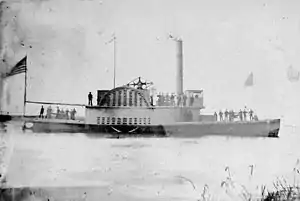 USS O. M. Pettit, ca. 1860s, location unknown | |
| History | |
|---|---|
| Name | USS O. M. Pettit |
| Launched | 1857 |
| Acquired | 17 August 1861 |
| Commissioned | 4 October 1861 |
| Decommissioned | 1865 |
| Fate |
|
| General characteristics | |
| Type | tug |
| Displacement | 165 tons |
| Length | 106 ft (32 m) |
| Beam | 28 ft 4 in (8.64 m) |
| Draft | 6 ft (1.8 m) |
| Depth of hold | 7 ft (2.1 m) |
| Propulsion | Steam engine, sidewheel |
| Speed | 8 knots (15 km/h; 9.2 mph) |
| Armament |
|
USS O. M. Pettit was a steamer acquired by the Union Navy during the American Civil War. She was used by the Navy as a tugboat to service Union Navy ships blockading ports of the Confederate States of America.
Service history
Oliver M. Pettit was a wooden sidewheel paddle steamer built in 1857 at Williamsburg, New York. The United States Navy purchased her at New York City on 17 August 1861 and commissioned her at the New York Navy Yard in Brooklyn, New York, on 4 October 1861, as USS O. M. Pettit.
After serving as a tug at the New York Navy Yard, the O. M. Petit joined the South Atlantic Blockading Squadron early in 1862 for service in the Union blockade of the Confederate States of America. She performed similar services at Port Royal, South Carolina.
On 24 April 1865, as the American Civil War came to a close, O. M. Petit sank in the Savannah River near Hammond, Georgia. She was refloated, repaired, and returned to service.[1]
After the American Civil War, O. M. Pettit was sold at Bay Point in Charleston Harbor, South Carolina, on 2 September 1865 to J. W. Walcott. She was abandoned in 1879.
References
- ↑ Gaines, W. Craig, Encyclopedia of Civil War Shipwrecks, Baton Rouge, Louisiana: Louisiana State University Press, 2008, ISBN 978-0-8071-3274-6, unpaginated entries for General Lee and Petit.
This article incorporates text from the public domain Dictionary of American Naval Fighting Ships. The entry can be found here.